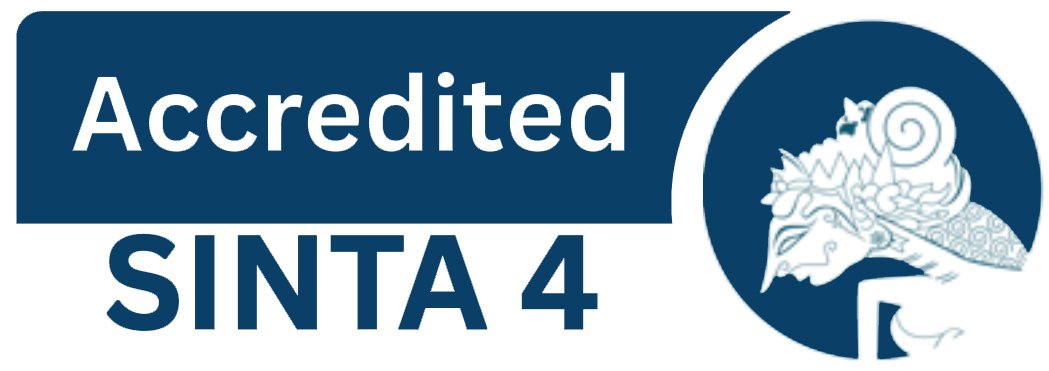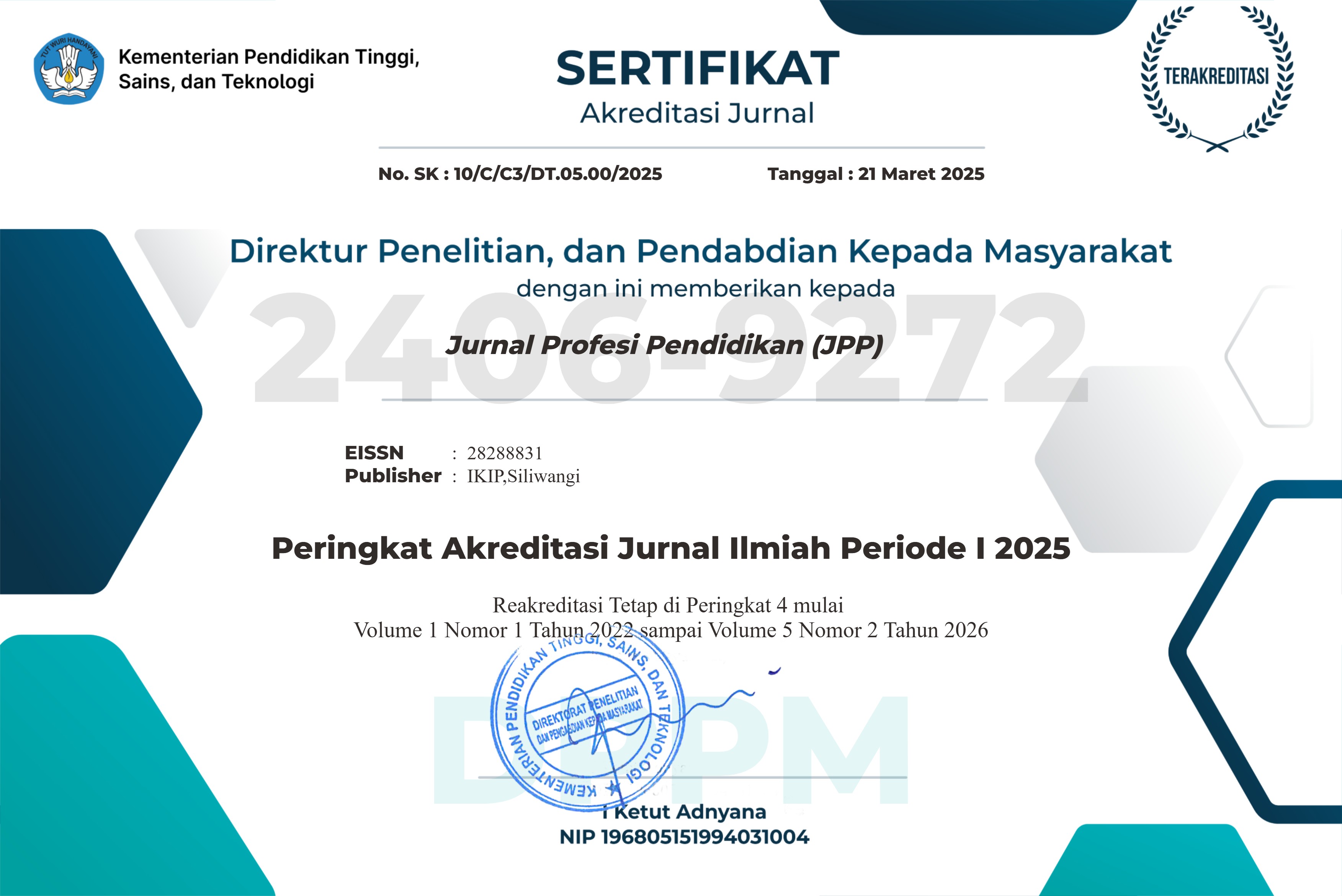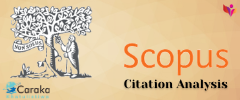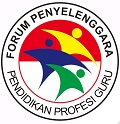Pengaruh Pendekatan Matematika Realistik Terhadap Kemampuan Koneksi Matematis Siswa Sekolah Dasar
DOI:
https://doi.org/10.22460/jpp.v1i1.10451Keywords:
matematika realistic, koneksi matematis, sekolah dasarAbstract
Penelitian ini bertujuan untuk mengetahui pengaruh pendekatan matematika realistik terhadap kemampuan koneksi matematis siswa sekolah dasar. Metode yang digunakan adalah eksperimen murni. Populasi yang diambil dalam penelitian ini adalah seluruh siswa kelas V sekolah dasar (SD) Kecamatan Sumedang Utara. Adapun sampel yang digunakan adalah siswa kelas V SDN Sindang 2 dan SDN Sindang 3. Instrumen yang digunakan diantaranya soal tes koneksi matematika, observasi siswa dan angket respon siswa. Berdasarkan didasarkan pada hasil uji nonparametric N-gain dari pretest dan posttest kelas eksperimen dan kontrol melalui uji-U (Mann-Whitney) dengan taraf signifikansi α = 0,05 diperoleh P-value (Sig. 1-tailed) sebesar 0,000. Dengan demikian hasil penghitungan dapat dinyatakan P-value < α, sehingga H0 ditolak. Artinya pembelajaran matematika dengan menggunakan pendekatan matematika realistik lebih baik secara signifikan daripada pembelajaran dengan menggunakan pendekatan konvensional dalam meningkatkan kemampuan koneksi matematis siswa sekolah dasar. Selain itu, aktifitas siswa dalam pembelajaran cukup baik dan tingkat respon siswa sebesar 76,35% yang diinterpretasikan positif terhadap pembelajaran yang dilakukan dengan menggunakan pendekatan matematika realistik.
References
Annisa Indrawati, F. (2019). Pengaruh Self Efficacy Terhadap Kemampuan Literasi Matematika dan Pembentukan Kemampuan 4C. PRISMA, Prosiding Seminar Nasional Matematika 2. PRISMA.
Bito, G. S. (2016). AKTIVITAS BERMAIN SEBAGAI KONTEKS DALAM BELAJAR MATEMATIKA DI SEKOLAH DASAR DENGAN PENDEKATAN MATEMATIKA REALISTIK. Jurnal Pemikiran Dan Pengembangan Sekolah Dasar (JP2SD). https://doi.org/10.22219/jp2sd.vol1.no4.250-255
Ervayani, E., Holisin, I., & Shoffa, S. (2016). Penerapan Teori Belajar Bruner dengan Pendekatan Pendidikan Matematika Realistik di Kelas III SD Muhammadiyah 9 Surabaya. MUST: Journal of Mathematics Education, Science and Technology. https://doi.org/10.30651/must.v1i1.102
Hatip, A., & Setiawan, W. (2021). TEORI KOGNITIF BRUNER DALAM PEMBELAJARAN MATEMATIKA. PHI: Jurnal Pendidikan Matematika. https://doi.org/10.33087/phi.v5i2.141
Hendriana, H., Rohaeti, E. E., & Sumarmo, U. (2021). Hard Skills dan Soft Skills Matematik Siswa. PT Refika Aditama.
Nur, R. (2013). HAKIKAT PENDIDIKAN MATEMATIKA. Jurnal Pendidikan Matematika.
OECD. (2015). Skills for social progress: the power of social and emotional skills. In OECD Skills Studies.
Pitajeng, P. (2006). Peningkatan Kemampuan Memecahkan Masalah dengan Pembelajaran Kontekstual dan Penggunaan Open-ended Problems. Urnal Kependidikan: Penelitian Inovasi Pembelajaran, 36(1). https://doi.org/https://doi.org/10.21831/jk.v36i1.7285
Putri, H. E., Pertiwi, C. K., Arrum, A. H., Nurhanifa, R., & Yuliyanto, A. (2021). MATHEMATICAL CONNECTION ABILITY INSTRUMENT FOR PRIMARY SCHOOL STUDENTS. AULADUNA: Jurnal Pendidikan Dasar Islam. https://doi.org/10.24252/auladuna.v8i1a1.2021
Reynolds, D., Chapman, C., Kelly, A., Muijs, D., & Sammons, P. (2011). Educational effectiveness: The development of the discipline, the critiques, the defence, and the present debate. Effective Education. https://doi.org/10.1080/19415532.2011.686168
Sugiyono. (2010). Metode Penelitian Bisnis. Pendekatan Kuantitatif, kualitatif dan R & D. Bandung: Alfabeta.
Sumarni, Y. (2018). Matematika dalam Ilmu Manajemen. Education, 1.
Tarigan, R. (2021). PERKEMBANGAN MATEMATIKA DALAM FILSAFAT DAN ALIRAN FORMALISME YANG TERKANDUNG DALAM FILSAFAT MATEMATIKA. Sepren. https://doi.org/10.36655/sepren.v2i2.508
Yusri, Y., & Arifin, S. (2018). DESAIN PEMBELAJARAN KOOPERATIF BERBASIS TEORI BRUNER UNTUK MENINGKATKAN KUALITAS PEMBELAJARAN MATEMATIKA. HISTOGRAM: Jurnal Pendidikan Matematika. https://doi.org/10.31100/histogram.v2i2.233
Downloads
Published
How to Cite
Issue
Section
License
Copyright (c) 2022 JPP (Jurnal Profesi Pendidikan)

This work is licensed under a Creative Commons Attribution-ShareAlike 4.0 International License.
Authors who publish with the Journal Pendidikan Profesi (JPP) agree to the following terms:
- Authors retain copyright and grant the journal the right of first publication with the work simultaneously licensed under a Creative Commons Attribution License (CC BY-SA 4.0) that allows others to share the work with an acknowledgment of the work's authorship and initial publication in this journal.
- Authors are able to enter into separate, additional contractual arrangements for the non-exclusive distribution of the journal's published version of the work (e.g., post it to an institutional repository or publish it in a book), with an acknowledgment of its initial publication in this journal.
- Authors are permitted and encouraged to post their work online (e.g., in institutional repositories or on their website) prior to and during the submission process, as it can lead to productive exchanges, as well as earlier and greater citation of published work. (See The Effect of Open Access)
Similar Articles
- Kurnia Akbar, Citadewi Aditya, Lathifah Rizki, Nelly Ade Karisma, Selvi Novitasari, Widya Sulistia, Yulianti Yulianti, Penerapan Model Problem Based Learning Berbantuan Komik Digital untuk Meningkatkan Pemahaman Konsep Matematis Siswa pada Materi Perkalian Pecahan di Kelas V Sekolah Dasar , Jurnal Profesi Pendidikan: Vol. 3 No. 2 (2024): December
- Luviani Sri Rezeki, Trisna Nugraha, Penggunaan Model Project Based Learning Berbasis Socio Scientific Issues untuk Meningkatkan Kemampuan Berpikir Kreatif Siswa Kelas IV Sekolah Dasar , Jurnal Profesi Pendidikan: Vol. 3 No. 2 (2024): December
- Paulina Sri Fajar Br. Aritonang, Rika Amelia, Rizky Afianto, Salsabila Amalia, Aflich Yusnita Fitrianna, Penerapan Problem Based Learning (PBL) dalam Meningkatkan Kemampuan Berpikir Kritis Siswa di Sekolah , Jurnal Profesi Pendidikan: Vol. 3 No. 2 (2024): December
- Windi Triwahyuni, Jajang Bayu Kelana, Duhita Savira Wardani, Penggunaan Model Kooperatif Picture and Picture Berbantuan Canva untuk Meningkatkan Berpikir Kreatif Siswa pada Materi Daur Hidup Hewan di Sekolah Dasar , Jurnal Profesi Pendidikan: Vol. 3 No. 2 (2024): December
- Greesla Anggera Jaya, Jajang Bayu Kelana, Peningkatan Pemecahan Masalah Matematika Menggunakan Model Pembelajaran Problem Based Learning Berbantuan Bar Modelling Untuk Siswa Sekolah Dasar , Jurnal Profesi Pendidikan: Vol. 1 No. 1 (2022): June
- Enur Nurmawati, Meningkatkan Motivasi dan Hasil Belajar Matematika Peserta Didik Kelas VII Melalui Penerapan Model Pembelajaran Problem Based Learning , Jurnal Profesi Pendidikan: Vol. 3 No. 1 (2024): June
- Isyfa Robi’ah Al-Adawiyah, Neneng Kurnia Sandi, Rima Rahmawati Permana, Sulastri Nurmaya, Ryan Dwi Puspita, Analisis Model Pembelajaran Projek Based Learning (Pjbl) Terhadap Konsentrasi Belajar Peserta Didik di Sekolah Dasar , Jurnal Profesi Pendidikan: Vol. 3 No. 1 (2024): June
- Medita Ayu Wulandari, Anwar Senen, Duhita Savira Wardani, Siti Ruqoyyah, Transforming Education Through Project-Based Learning (PjBL): Enhancing Students' Learning Outcomes and Critical Thinking , Jurnal Profesi Pendidikan: Vol. 4 No. 1 (2025): June
- Ahadiyatul Kamilah, Siti Ruqoyyah, Keterampilan Membaca Permulaan Siswa Kelas 1 SD Menggunakan Contextual Teaching And Learning Berbantuan Kartu Kata , Jurnal Profesi Pendidikan: Vol. 1 No. 1 (2022): June
- Ayang Wike Sintia, Jajang Bayu Kelana, Anugrah Ramadhan Firdaus, Peningkatan Keterampilan Berpikir Kritis Pada Mata Pelajaran IPA Materi Rangkaian Listrik Sederhana Dengan Menggunakan Model Pembelajaran STEM di Kelas VI Sekolah Dasar , Jurnal Profesi Pendidikan: Vol. 3 No. 1 (2024): June
You may also start an advanced similarity search for this article.

















